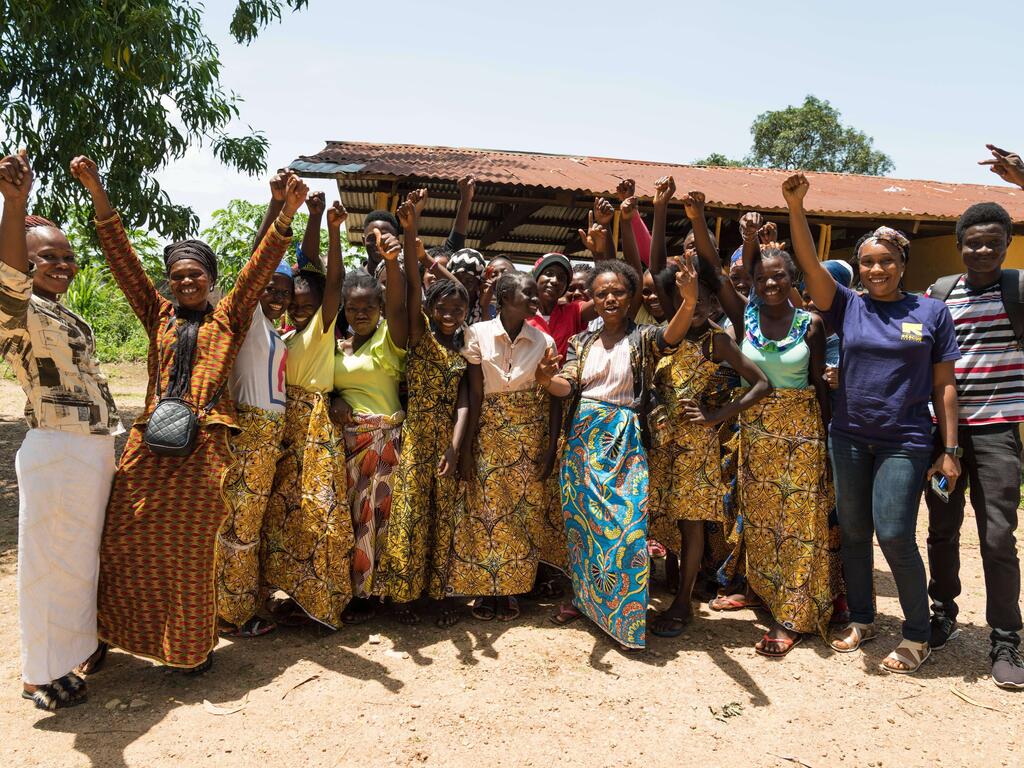Girls can transform any community, when we are heard, respected and able to access opportunities.
- Hajah, EAGER Graduate, Sierra Leone
Project evaluations:
Project studies:
- EAGER Value for Money Analysis Report
- EAGER Scenario Analysis: A Case for Program Sustainability and Scaling Costs
- EAGER: A Program Implementation Quality Case Study
- EAGER Social and Behavioral Change Communication Endline Study
EAGER Toolkit: Conducting Monitoring with and for Adolescent Girls
Visit EAGER Monitoring, Research and Evaluation library for more resources.
EAGER Stories of Change
Hear from the EAGER girls, volunteers and communities about how their lives changed through the program.
Every Adolescent Girl Empowered and Resilient (EAGER) is a girls’ education and empowerment project that created new learning opportunities for 27,322 out-of-school adolescent girls in 10 districts of Sierra Leone. Led by the International Rescue Committee in partnership with Concern Worldwide, Restless Development, and BBC Media Action, EAGER was implemented from February 2019 to March 2023 with funding from FCDO through the Leave No Girl Behind initiative of the Girls' Education Challenge.
EAGER was designed to meet the learning needs of girls ages 13-17 (expanded to 19 for the second cohort) who had missed out on formal education. The project’s Baseline Evaluation confirmed that 45.3% of enrolled girls had never attended school and 45.2% had dropped out before completing primary school – mostly because they could not pay for the associated costs (72.2%), needed to work (23.4%), or became pregnant (18.9%). Whilst many girls demonstrated pre-literacy skills, 88.9% achieved a ‘non-learner’ score during assessment. EAGER’s literacy, numeracy, and financial literacy curricula met the girls where they were and led them, with the guidance of community-based Facilitators, on an 8-month learning journey to build foundational skills that would empower them in their daily lives.
Understanding that many girls also faced social barriers including stigma, isolation from peers, and heavy chore burdens [44.1% were married, 57.5% were mothers, 9% were head of household, and 14.6% were living with disabilities: of these, 60% in whole or part due to anxiety or depression], EAGER designed a holistic learning approach to strengthen their psychosocial wellbeing, resilience, and agency. Girls learned in dedicated Safe Spaces, engaged in weekly Life Skills sessions led by female Mentors who were also trained in Psychological First Aid, and every girl had an EAGER Padi (friend) to build her social assets from the start of the programme. Working with community-based Mentors and Facilitators to deliver this integrated learning programme established a support system that would last beyond the project, and created new role models and advocates for girls in their communities.
The first day I started, when I hold the pen, I was nerving because I never held a pen before. But the the Facilitators and Mentors [...] tell us we should not be ashamed to learned. I was ashamed to talk, but right now, I will not fear anymore. What helped me to have confidence, is the way they talk to you [...] They said we should not fear or be ashamed of anything"
- EAGER Graduate, Tonkolili district
To further strengthen the support systems around girls, EAGER led structured Community Dialogues with community leaders and caregivers to deepen their understanding of girls’ barriers and rights. This fostered accountability to girls and led to collective action planning at the community level. EAGER’s weekly girl-centred radio programmes were broadcast across 64 radio stations and engaged 1.7 million listeners (31% of Sierra Leone’s 15+ population) in factual and drama-discussion shows designed to raise awareness on the impacts of harmful gender norms and practices on girls, whilst showcasing girls’ voices and agency.
Before EAGER, I was very shy to speak in public, but now I am bold and I have the awareness, [...] EAGER has done a great thing in my life. I was a victim when I was little, especially in terms of consent and the right to say no, and now EAGER has given me that acknowledgment. I have self-confidence.
- EAGER Mentor
After graduating from the learning programme, the girls began an 8-month Transition period guided by an Empowerment Plan that every girl created for herself with her own learning, household, community, and financial goals. Each girl received an equal conditional cash transfer and Empowerment Package to support her goals. The Transition model encouraged girls to integrate and use the many skills they had learned, and included check-ins with their Mentors. Girls were also supported to start and lead their own Girls’ Clubs as a way to continue learning together and keep their social networks strong.
We have a girls’ club group here; the purpose of the group is to see how best we can come together to help one another. We do contribute some sums of money to the group as a form of savings so that whoever wants to do business can come to the group and borrow money which she will in turn pay. Whenever a member of the group falls sick, the other members will pay a visit and help in whatever ways they can.
- EAGER Girls Club, Koinadugu district
EAGER was built on the premise that girls are resilient, powerful, and resourceful, and that they are the experts in determining their future. The project has demonstrated that investing in girls’ education in a way that is responsive to their specific needs, context, and lived experiences strengthens girls’ agency and power to shape their lives and increases the overall wellbeing of families and communities.

